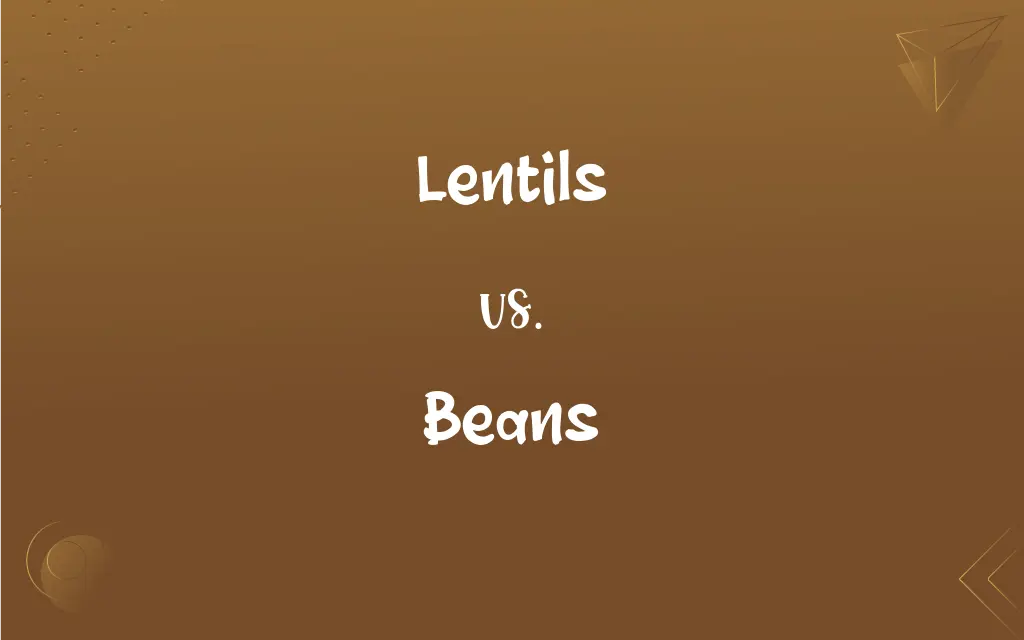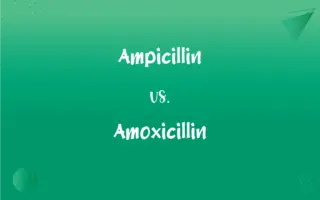Lentils vs. Beans: What's the Difference?
Edited by Aimie Carlson || By Harlon Moss || Updated on October 18, 2023
Lentils are small, lens-shaped legumes, while beans refer to various larger seeds from the Fabaceae family.

Key Differences
Lentils are typically smaller and lens-shaped, making them distinct in appearance from most beans. On the other hand, beans come in various shapes and sizes, with many being considerably larger than lentils.
In culinary applications, lentils generally cook faster due to their smaller size, while beans often require a longer cooking time or pre-soaking. This makes lentils a go-to choice for quick dishes, whereas beans might be reserved for meals that allow for more prep time.
Nutritionally, both lentils and beans are rich sources of protein, fiber, and essential minerals. However, the specific nutritional profiles can differ, with lentils often being slightly higher in protein and beans sometimes having a broader range of vitamins.
Lentils come in several colors, including brown, green, red, and black. Beans, on the other hand, offer a broader spectrum of types and colors, from black beans to pinto beans, kidney beans, and many more.
While both lentils and beans are staples in cuisines worldwide, they often appear in different traditional dishes. Lentils are prominent in dishes like Indian dals and soups, while beans are commonly used in dishes like Mexican refried beans or American baked beans.
ADVERTISEMENT
Comparison Chart
Shape and Size
Small and lens-shaped
Various shapes, generally larger
Cooking Time
Cooks faster
Often requires longer cooking or pre-soaking
Nutritional Content
Slightly higher in protein
Broader range of vitamins
Variety and Colors
Brown, green, red, black
Black, pinto, kidney, navy, and more
Common Culinary Uses
Indian dals, soups
Refried beans, baked beans, salads
ADVERTISEMENT
Lentils and Beans Definitions
Lentils
Small, lens-shaped legumes.
She added lentils to the soup for extra protein.
Beans
Seeds from the Fabaceae family.
She used black beans for the burrito filling.
Lentils
Main ingredient in various dals and soups.
She used red lentils for the creamy dal makhani.
Beans
Often require pre-soaking or longer cooking times.
The beans soaked overnight to reduce their cooking time.
Lentils
Quick-cooking legumes.
Lentils are a time-saver since they don't need soaking.
Beans
Nutrient-dense food source.
Beans are a great source of protein and fiber for vegetarians.
Lentils
High in protein and fiber.
For a protein boost, consider adding lentils to your diet.
Beans
Featured in a wide variety of dishes worldwide.
Beans are the main ingredient in the popular chili con carne.
Lentils
Comes in various colors.
Green lentils retain their shape well in salads.
Beans
Come in a multitude of varieties and colors.
She chose pinto beans for her homemade bean soup.
Lentils
A leguminous plant (Lens culinaris) native to southwest Asia, having flat pods containing lens-shaped, edible seeds.
Beans
Any of various twining herbs of the genus Phaseolus in the pea family, native to the Americas, having leaves with three leaflets and variously colored flowers, and widely cultivated for their edible pods and seeds.
Lentils
The round, flattened seed of this plant.
Beans
A seed or pod of any of these plants.
Lentils
Plural of lentil
FAQs
What are lentils and beans?
Lentils are small, lens-shaped legumes, while beans are larger seeds from the Fabaceae family.
Do lentils cook faster than beans?
Yes, lentils generally cook faster than beans, which may need pre-soaking.
Are lentils used in Indian cuisine?
Yes, lentils are a staple in Indian cuisine, especially in dishes like dals.
How should beans be stored?
Dry beans should be stored in a cool, dry place, while cooked beans should be refrigerated.
What are the health benefits of lentils?
Lentils are rich in fiber, protein, and various essential minerals, promoting heart health and stable blood sugar levels.
Can lentils and beans be used in salads?
Absolutely, both lentils and beans are popular additions to salads.
How can one reduce the gassy effect of beans?
Rinsing beans thoroughly, soaking them, and discarding the soaking water can help reduce their gassy effect.
Can lentils be used as a substitute for beans?
While they can be substituted in some dishes, they have different textures and flavors, so adjustments might be needed.
Do beans come in different colors?
Yes, beans can be black, pinto, kidney, navy, and more.
Are lentils gluten-free?
Yes, lentils are naturally gluten-free.
Which is higher in protein, lentils or beans?
While both are high in protein, lentils often contain slightly more protein than beans.
Can beans be consumed raw?
No, beans should be properly cooked before consumption.
What are some popular bean dishes?
Some popular dishes include refried beans, baked beans, and chili con carne.
Do beans cause gas?
Some people might experience gas after consuming beans due to certain carbohydrates.
Are lentils a type of bean?
While both are legumes, lentils and beans are distinct types with different shapes and sizes.
Why are lentils called "lens-shaped"?
The term refers to their small, disc-like appearance, similar to a lens.
How long can cooked beans be stored in the refrigerator?
Cooked beans can be stored in the refrigerator for about 3-5 days.
Are both lentils and beans nutritious?
Absolutely, both lentils and beans are rich in protein, fiber, and essential minerals.
Are beans and lentils considered vegan?
Yes, both beans and lentils are plant-based and are considered vegan.
Do lentils require soaking before cooking?
No, lentils don't generally require soaking like some beans do.
About Author
Written by
Harlon MossHarlon is a seasoned quality moderator and accomplished content writer for Difference Wiki. An alumnus of the prestigious University of California, he earned his degree in Computer Science. Leveraging his academic background, Harlon brings a meticulous and informed perspective to his work, ensuring content accuracy and excellence.
Edited by
Aimie CarlsonAimie Carlson, holding a master's degree in English literature, is a fervent English language enthusiast. She lends her writing talents to Difference Wiki, a prominent website that specializes in comparisons, offering readers insightful analyses that both captivate and inform.































































